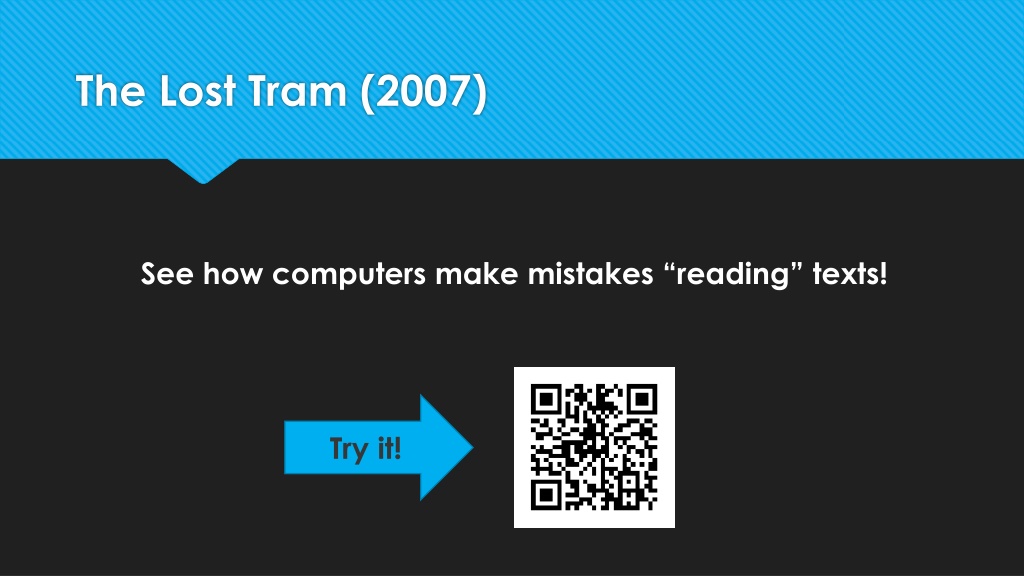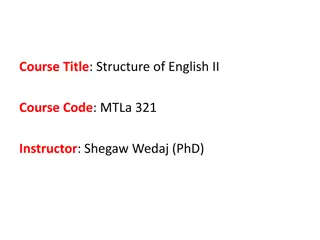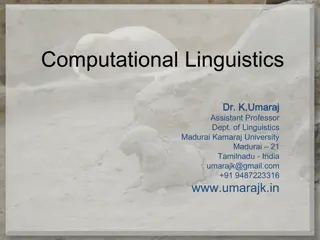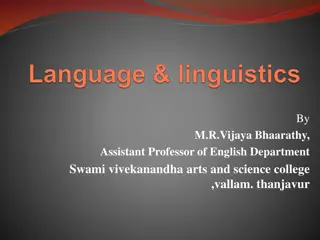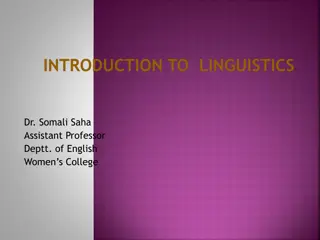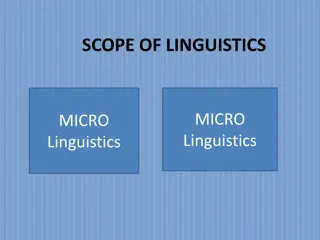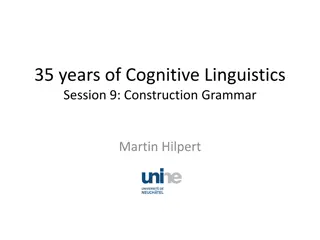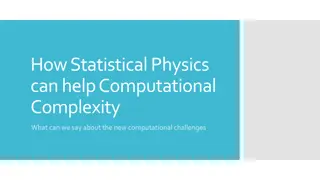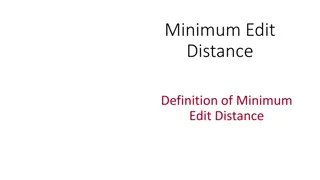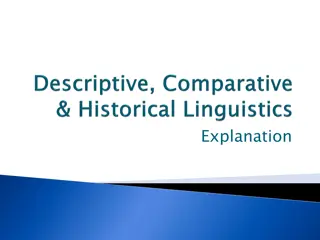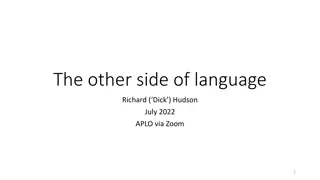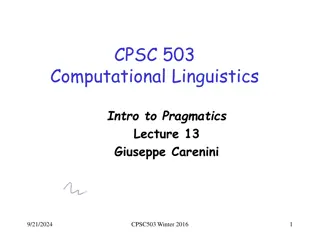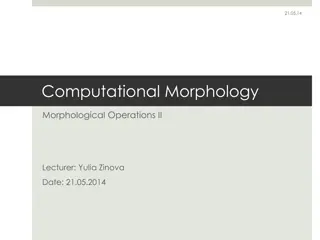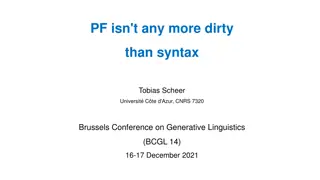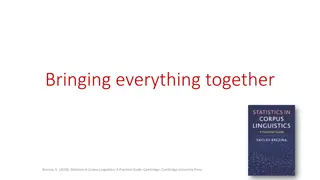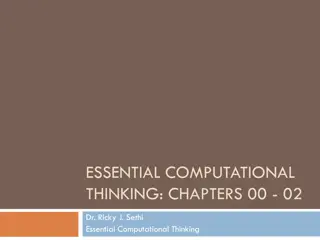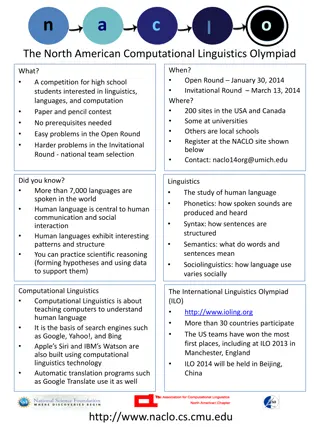Explore the World of Computational Linguistics: An Interactive Journey
Embark on a captivating interactive journey into the realm of computational linguistics through a series of engaging activities and challenges. Discover how machines process texts, decode mysterious languages, understand Japanese with data structures, and more. Test your skills in deciphering languages like Tajik and exploring abstract machines like finite state automata. Unravel the fascinating world of languages and technology in this immersive experience.
- Computational Linguistics
- Interactive Activities
- Language Decoding
- Machine Translation
- Cultural Exploration
Download Presentation

Please find below an Image/Link to download the presentation.
The content on the website is provided AS IS for your information and personal use only. It may not be sold, licensed, or shared on other websites without obtaining consent from the author. Download presentation by click this link. If you encounter any issues during the download, it is possible that the publisher has removed the file from their server.
E N D
Presentation Transcript
The Lost Tram (2007) See how computers make mistakes reading texts! Try it!
The North American Computational Linguistics Olympiad www.naclo.cs.cmu.edu
CAN YOU GUESS THE LANGUAGE? HINT #1: It s spoken by nearly 65 million people in Southeast Asia. HINT #2: Its writing system looks like this: HINT #3: It s closely related to Pali, Sanskrit, Lao, and the minority languages of Thailand. Thai Source: www.omniglot.com
Springing up Baby (2008) Don t know Hindi? No problem! Learn how machine translation works by decoding the mystery words in this problem. Try it!
Fakepapershelfmaker (2008) See how a data structure called a tree can help you understand Japanese. Try it!
The North American Computational Linguistics Olympiad www.naclo.cs.cmu.edu
Thorny Stems (2008) Stemmers help search engines work by chopping suffixes off of words (ex. walk, walking, walked ). Can you fix this one? Try it!
Here are three phrases in Tajik, a language spoken in Tajikistan and Central Asia. a good friend of your neighbor a neighbor of your good friend a good neighbor of your friend Can you match the Tajik words below to their English translations? Hint: word order in Tajik and in English is not the same! Thirty seconds left! One minute left! a.good b.friend c. neighbor d.your Source: Adriana Solovyova
aw-TOM-uh-tuh (2008) See how an abstract machine called a finite state automaton can help you identify the words of this New Guinea language. Try it!
The Whole Spectrum (2008) Learn the language of spectrograms. Try it!
The North American Computational Linguistics Olympiad www.naclo.cs.cmu.edu
Nok-Nok! (2009) Christopher Robin needs help with spelling. Can you figure out how his spelling checker works? Try it!
Help my camera! (2009) This chat bot is not making sense! Can you figure out how to fix it? Try it!
DID YOU KNOW? Not all languages have the same sounds! Let s try some sounds not usually found in English. Glottal stop the sound in the middle of uh-oh Retroflex press the bottom of your tongue to the roof of your mouth, then let it go while saying t Click press the tip of your tongue to the roof of your mouth, hard, then let go
Sk8 Parsr (2009) In this fictional video game, the moves can be pretty complex. But how complex can they get before they break the program? Try it!
Orwellspeak (2009) In a dystopian future, a repressive government tries to prevent people from saying false sentences. Try it!
The North American Computational Linguistics Olympiad www.naclo.cs.cmu.edu
Texting, Texting, One, Two, Three (2010) Learn about data compression while cracking an imaginary cell phone code. Try it!
Dogs and Cats on Trees (2010) Learn how computers parse, or break apart, sentences, and learn Malayalam (an Indian language) at the same time! Try it!
CAN YOU GUESS THE LANGUAGE? HINT #1: It s an indigenous language of the United States. HINT #2: Its writing system looks like this: HINT #3: The name of the language, in the language, is Tsalagi. Cherokee Source: www.omniglot.com
F u cn rd ths (2010) The overworked employees in a call center have developed a strange writing system with abbreviations. Can you decipher it? Try it!
Real Money (2010) This math puzzle would be a challenge in English can you solve it in Quechua (a language from South America)? Try it!
The North American Computational Linguistics Olympiad www.naclo.cs.cmu.edu
Khipu (2010) Decipher an ancient Inca system of knots that was used for record keeping. Try it!
Running on MT (2011) An automated translation program is making mistakes. Can you figure out why? Try it!
Here are some sentences in Yaqui, a Native American language spoken in Arizona and Mexico, and their English translations in random order: Inepo siika. A. You helped me. Empo nee aniak. B. You danced. Inepo apo ik aniak. C. I saw you. Inepo apo ik vichak. D. I saw him. Thirty seconds left! Two minutes left! Inepo enchi vichak. E. I helped you. One minute left! Inepo enchi aniak. F. I helped him. Empo ye ek. G. He saw you. Aapo enchi vichak. H. I left. Can you match the Yaqui sentences to their English translations? Source: Tom Payne
Interstellar First Contact (2012) It s the year 2354 AD, and we ve finally managed to make contact with aliens. Can you use a peace message to translate from one alien language to another? Try it!
Waorani Numbers (2012) Solve this math puzzle to learn how to count in the Waorani language of Ecuador! Try it!
The North American Computational Linguistics Olympiad www.naclo.cs.cmu.edu
The Little Engine that Could Read (2012) Professor Monotone has a machine that can make inferences, but it s broken. Can you fix it? Try it!
Jeg kan tlle (2007) Can you figure out how to count in Danish? Try it!
DID YOU KNOW? There are over 7,000 languages spoken around the world. Over 382 of those languages are spoken in the United States! Greek Vietnamese Navajo Persian Mon-Khmer Hebrew French Creole Spanish Yiddish Tagalog Gujarati Laotian Arabic Armenian Hmong Polish Thai Source: www.census.gov
One, Two, Tree (2012) How many meanings are there for this phrase: space mission control freak show? How can we use math to figure it out? Try it!
The Heads and Tails of Huffman (2013) Deb and her friend Ahab encode their messages in the binary language of heads and tails, but they don t have a lot of coins. How can they shorten their messages? Try it!
The North American Computational Linguistics Olympiad www.naclo.cs.cmu.edu
Grammar Rules (2013) Learn how computers can analyze grammar using a notation system called context-free rules. Try it!
CAN YOU GUESS THE LANGUAGE? HINT #1: Its writing system is called Mkhedruli and looks like this: HINT #2: It s spoken in Georgia, Armenia, Azerbaijan, Iran, and other countries in the South Caucasus. HINT #3: It shares the name of the main country where it s spoken. Georgian Source: www.omniglot.com
Twodee (2013) Sometimes, the same sentence can have two or more meanings! Learn about a writing system designed to fix this problem. Try it!
Yesbot (2013) Can you make this slightly deranged chat bot smarter? Try it!
The North American Computational Linguistics Olympiad www.naclo.cs.cmu.edu
DID YOU KNOW? English is written left-to-right, but not all languages are! Arabic is written right-to-left: And Mongolian is written up-to-down!
A Tree by Any Other Name (2013) Use decision trees to explain the difference between phrases like come up with and come down with . Try it!
Grices Grifter Gadgets (2013) You have a flying robot that helps you cheat at card games, but how can you program it to give you better hints? Try it!
Here are some dates in Swahili, a language spoken in eastern Africa, and their English translations in random order: Thirty seconds left! One minute left! Two minutes left! Three minutes left! tarehe tatu Disemba jumamosi A. Monday, October 5th tarehe pili Aprili jumanne B. Wednesday, October 5th tarehe nne Aprili jumanne C. Sunday, October 5th tarehe tano Oktoba jumapili D. Tuesday, April 2nd tarehe tano Oktoba jumatatu E. Tuesday, April 4th tarehe tano Oktoba jumatano F. Saturday, December 3rd Can you match the Swahili dates to their English translations? Source: A. N. Zhurinsky, Valentin Vydrin
